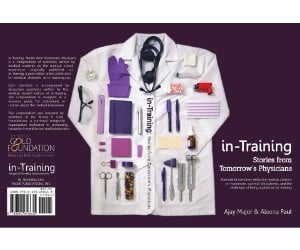
Book Review | in-Training: Stories from Tomorrow’s Physicians
In early 2012, medical students Ajay Major and Aleena Paul started in-Training.org, a website dedicated ... Read more
Written by: Student Doctor Network
Published on: September 29, 2016

In early 2012, medical students Ajay Major and Aleena Paul started in-Training.org, a website dedicated ... Read more
Written by: Student Doctor Network
Published on: September 29, 2016

While your dream of getting accepted to medical school probably involves countless nights studying, hundreds ... Read more
Written by: AAMC Staff
Published on: September 27, 2016

Central to the skillset of every physician is the differential diagnosis; this is the process ... Read more
Written by: Brent Schnipke
Published on: September 26, 2016

Taking the MCAT can be a nerve-wracking experience. In fact, many students develop significant test ... Read more
Written by: Anubodh “Sunny” Varshney
Published on: September 19, 2016

Recognizing the connection between lab work and surgery What surprised me the most during my ... Read more
Written by: Michael Mehlman
Published on: September 7, 2016

Poker, one may reasonably argue, is a game of sheer luck; he (or she) who ... Read more
Written by: Suhil Aggarwal
Published on: August 2, 2016

Reposted from here with permission. “Of all the forms of inequality, injustice in health care ... Read more
Written by: Suhas Gondi
Published on: July 27, 2016

Central to the skillset of every physician is the differential diagnosis. This is a list of ... Read more
Written by: Brent Schnipke
Published on: July 19, 2016

The tradition of long hours on the floor is an old one in American medical ... Read more
Written by: Brian Wu
Published on: June 20, 2016

An Ongoing Dialogue Between Medicine and Law It is no wonder why medical schools across ... Read more
Written by: Brian Wu
Published on: June 13, 2016

If you are in medical school, you have been making choices for a long time ... Read more
Written by: Brian Wu
Published on: June 6, 2016

It might actually come as a surprise to many would-be medical students that gender is ... Read more
Written by: Brian Wu
Published on: May 23, 2016

By Michelle Finkel, MD Whether you are a candidate for medical school, residency, fellowship, dental ... Read more
Written by: Michelle Finkel
Published on: May 10, 2016

Updated December 1, 2021. The article was updated to correct minor grammatical errors and to ... Read more
Written by: Coalition for Disability Access
Published on: May 5, 2016

Dr. Matt McCarthy is an assistant professor of medicine at Weill Cornell Medical College and ... Read more
Written by: Christy Duan
Published on: May 4, 2016

Make sure to check out Part I here! Today’s article takes a closer look at ... Read more
Written by: Jennifer Colagiovanni
Published on: April 12, 2016

What made you decide to write your new book, Doctored? What were you hoping to accomplish? ... Read more
Written by: Brent Schnipke
Published on: April 12, 2016

Junior doctors [and residents in the US] do a valuable and sometimes life-saving job for ... Read more
Written by: Anne Caler
Published on: April 7, 2016

The advent of the Affordable Care Act was meant, in part, to help to increase ... Read more
Written by: Brian Wu
Published on: March 31, 2016